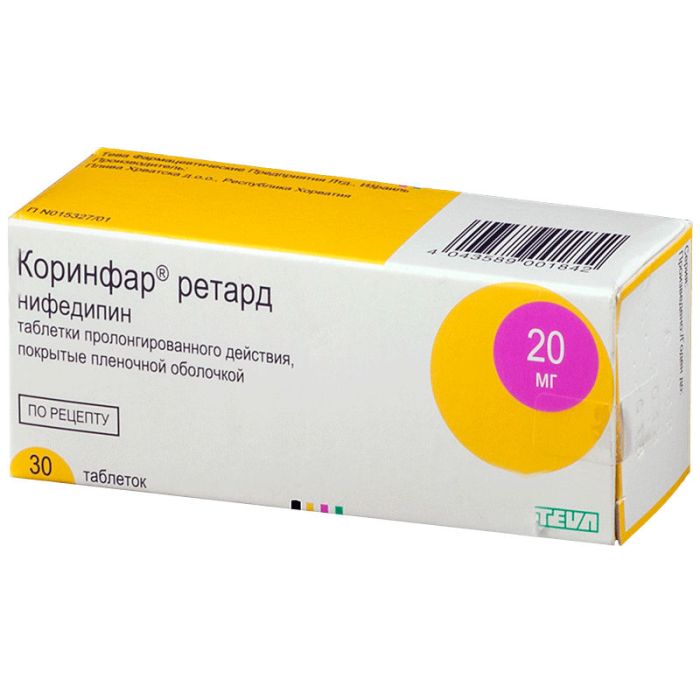Nifedipine | Corinfar retard tablets are covered.pl.ob.prolong. action 20 mg 30 pcs.
Special Price
$29
Regular Price
$36
In stock
SKU
BID470931
Release form
Coated tablets.
Packaging
In a blister pack of 10 tablets. There are 3 blisters in the package.
Indications
- Stable angina (angina pectoris).
- Angiospastic angina pectoris (Prinzmetal angina, variant angina pectoris).
- Essential arterial hypertension.
Contraindications
- Cardiogenic shock.
- Severe stenosis of the aortic orifice.
- Unstable angina pectoris.
- An acute period of myocardial infarction (during the first 4 weeks).
- Pregnancy.
- Lactation (breastfeeding).
- Hypersensitivity to nifedipine.
Pregnancy and lactation
Corinfar retard is contraindicated in pregnancy.
Nifedipine is excreted in breast milk. Data on the effect of nifedipine on the infant is not enough. Therefore, if you need to use Corinfar retard during lactation, breastfeeding should be discontinued.
Composition
1 sustained-release coated tablet contains: nifedipine 20 mg.
Excipients: Lactose monohydrate, magnesium stearate, macrogol 6000, macrogol 35 000, talc, potato starch, methylhydroxypropyl cellulose, polyvidone K25, microcrystalline cellulose, dyes (E104, E171).
Dosage and administration
Install individually.
The average dose is 20 mg 2 times / day. With insufficient severity of the clinical effect, a gradual increase in the dose of Corinfar retard to 40 mg 2 times / day is possible.
Maximum daily dose of 80 mg.
The interval between doses should not be less than 4 hours. When prescribing the drug 2 times / day. the recommended intake interval is approximately 12 hours (morning and evening).
Tablets are taken after a meal without chewing and drinking plenty of fluids.
Side effects
From the cardiovascular system, tachycardia, arrhythmias, palpitations, peripheral edema (ankles, feet, legs), manifestations of excessive vasodilation (asymptomatic decrease in blood pressure, development or worsening of heart failure, flushing of the skin of the face, flushing of the skin, feeling hot), a marked decrease in blood pressure (rarely), syncope. In some patients, especially at the beginning of treatment or when the dose is increased, angina attacks may occur, and in rare cases, myocardial infarction develops, which requires drug withdrawal.
From the nervous system: headache, dizziness, general weakness, increased fatigue, drowsiness. With prolonged use of the drug in high doses - limb paresthesia, tremor, extrapyramidal (parkinsonian) disorders (ataxia, masky face, shuffling gait, tremor of the hands and fingers, difficulty swallowing), depression.
From the digestive system: dyspepsia (nausea, diarrhea or constipation), dry mouth, flatulence, increased appetite. Rarely - gingival hyperplasia, completely disappearing after drug withdrawal. With prolonged use - impaired liver function (intrahepatic cholestasis, increased transaminase activity).
From the side of the musculoskeletal system: arthritis, myalgia, swelling of the joints.
Allergic reactions: rarely - itching, urticaria, exanthema, autoimmune hepatitis, photodermatitis, anaphylactic reactions, exfoliative dermatitis.
From the hemopoietic organs: anemia, leukopenia, thrombocytopenia, thrombocytopenic purpura, agranulocytosis.
From the urinary system: increased daily diuresis in the first weeks of admission, impaired renal function (in patients with renal failure).
Other: rarely - visual impairment (i.e. transient blindness with a maximum plasma concentration of nifedipine), gynecomastia (in elderly patients, completely disappearing after withdrawal), galactorrhea, hyperglycemia, pulmonary edema, weight gain.
Drug Interaction
When used with Corinthar Retard with other antihypertensive drugs, as well as with tricyclic antidepressants, there is an increase in the antihypertensive effect of Corinthian Retard.
With the simultaneous use of Corinthar retard with nitrates, the effect of Corinthar retard on blood pressure and heart rate is increased.
With the simultaneous use of Corinth, a retard with beta-blockers can cause a more severe drop in blood pressure, in addition there have been cases of weakening of cardiac activity.
When Corinthar is used with retard and cimetidine (less ranitidine), the effects of Corinthian retard may be enhanced.
With the concomitant use of Corinth, the retard with quinidine in some cases showed a decrease in the concentration of quinidine in the blood plasma, and after the abolition of Corinthian retard - a sharp increase in the concentration of quinidine in plasma.
With the simultaneous use of Corinth, the retard with digoxin and theophylline in some cases showed changes in the concentration of the latter in blood plasma.
Overdose
Symptoms: loss of consciousness up to coma, drop in blood pressure, tachycardia or bradycardia, hyperglycemia, metabolic acidosis, hypoxia.
Treatment: artificial vomiting, gastric lavage, symptomatic therapy aimed at maintaining cardiovascular activity.
Storage conditions
The drug should be stored in a dark place.
Expiration
3 years.
Deystvuyuschee substances
nifedipine
Terms of delivery from pharmacies
Prescription
Dosage form
Dosage form
tablets prolong.
Teva Pharmaceutical Enterprise Co., Ltd., Israel
Submit your review to Earn 10 Reward Points click here to login
Write Your Own Review

